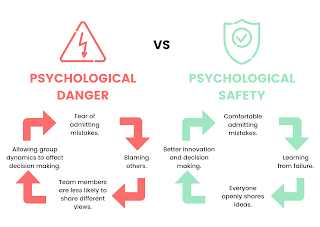Psychological Safety at Work
Psychological safety is defined as: “being able to show and employ one's self without fear of negative consequences of self-image, status or career. It can be defined as a shared belief that the team is safe for interpersonal risk taking. In psychologically safe teams, team members feel accepted and respected”.
The ability to escalate and share ideas is crucial for learning and development. Unfortunately, when people feel uncomfortable, they don’t have the courage to speak up. Historically, this has been the culture of the NHS but it is changing and I can say first hand, I have worked at multiple different trusts which work very differently. It’s so nice to now be in an environment where there is no longer a hierarchical system, but instead doctors respect midwives and appreciate their unique perspective.
As a domino effect of increased psychological safety, there is increased reporting of errors. This doesn’t mean that the incidence itself increases, but rather that people are more open, honest and willing to escalate. In more effective teams, these individuals are no longer judged with fear and blame at the heart of errors, but shifted to a perspective of learning.
Psychological safety also contributes to job satisfaction. As an individual feels less vulnerable, their job satisfaction improves, allowing for a level of learning which increases over time, eventually allowing for innovation. The learner pathway goes from a paternalistic exploitation to a respectful invitation to converse.
During my training, despite it being a group training, I was the only participant in attendance so it ended up being a one-to-one session. Whilst group sessions allow for discussions and sharing of ideas, it was quite unique to be able to get a chance to reflect entirely on my own experiences and discuss personal experiences. Reflecting back, it was interesting to appreciate the differences in my own practice overtime. From being a newly qualified midwife and trying to settle in, whilst feeling out of place because everyone else was already friends; to now feeling confident in my practice and part of the team, actively debating and challenging clinical practices. I also recognised that this is a fluid situation, dependent on the team members on each shift and both familiarity and understanding.
Does this resonate with you? How do you think you could improve psychological safety in your own working environment?


Great post and wonderful to hear your perspective. Are the images in this post free to use and if so who should get the credit? They are simple and easy to understand and I'd love to share on one of my posts. Please confirm.
ReplyDelete